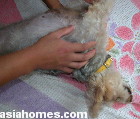Educational tips for pet lovers
The dog sees the vet and
goes into fits
Mrs Lee slid open the consultation room door carrying a Silkie
with jaws clamping open and shut non-stop, body trembling
violently and eyes looking very frightened, as if the dog had seen
a ghost. Watery drops of saliva drooled onto the stainless steel
top of the examination table.
"I am sorry to intrude. This is an emergency." Mrs Lee
said. A dog having uncontrolled body shaking, like an
epileptic person foaming in his mouth is frightening to anybody.
Will the dog die of heart failure if treatment is delayed as the
violent tremors showed no signs of abating?
I was completing my consultation on a dwarf hamster that was  not
eating. Its owner, a
ten-year-old girl was so shy that she would whisper her
observations and her mother would ask her to repeat her
answers. This hamster could not eat because the lower front
teeth had overgrown up and inwards into the roof of the mouth
while its upper front teeth were missing. They left the room
quickly. not
eating. Its owner, a
ten-year-old girl was so shy that she would whisper her
observations and her mother would ask her to repeat her
answers. This hamster could not eat because the lower front
teeth had overgrown up and inwards into the roof of the mouth
while its upper front teeth were missing. They left the room
quickly.
Dogs in fits are an emergency. The owner expected instant
treatment. I broke open a vial of anti-fit drug, looked for the
white spot which indicated the place to break the glass ampoule
safely. There it was but somehow, the broken top nicked my
left fore finger, causing blood to ooze from the
wound.
Mrs Lee said, "My dog has bitten his tongue. How to stop him
from biting his tongue?" The lower muzzle was stained
with bright red blood. There was no time to put something in his
mouth to save the tongue. I injected the drug into his back muscle
rather than injecting into his vein. He was not the typical
fits case and seemed to be frightened as well. Therefore,
finding his leg vein would delay the effect of the drug as he
would struggle more. He was already five minutes into fits, I
estimated. There was no time to take the history.
"Was he on anti-fit medication?" I asked Mrs Lee. This
was the first time I had met her and I presumed this was not his
first episode of fits.
"The other vet did not give such medication," she said.
This meant that the dog did have fits before.
"The rectal temperature is 40.2 degrees celcius while the
normal temperature should be less than 39.5 degrees."
Was the fever the cause of the fits? The thermometer could
not deceive. It would be a snap diagnosis of fever. Well fever was
not the cause of fits. Since the complaint was skin disease, the
dog would have been normal and the 'fever' would be caused by its
muscular tremors over five minutes.
She had brought the dog for consultation of skin disease on his
chest, the lower part called the sternum and the fits had just
happened when the dog arrived at the surgery. She had seen the
other vet twice in over 12 months but the condition had not
improved. Some skin diseases require follow up veterinary
examination a month later but the vast majority of Singapore
owners do not do so.
 "Maybe,
your dog is frightened of vets or veterinary premises," I
tried to lighten the situation with humour. This was a dog with
frightened eyes in addition to fits. So far, there have been no
reports of dogs going into fits on entering the veterinary
premises. All vets know of dogs refusing to enter the
veterinary premises or running out quickly and biting the vets
during examination to show their displeasure and their association
with pain. This was a dog who became hysterical and actually
developed fits on nearing the door of the
surgery. "Maybe,
your dog is frightened of vets or veterinary premises," I
tried to lighten the situation with humour. This was a dog with
frightened eyes in addition to fits. So far, there have been no
reports of dogs going into fits on entering the veterinary
premises. All vets know of dogs refusing to enter the
veterinary premises or running out quickly and biting the vets
during examination to show their displeasure and their association
with pain. This was a dog who became hysterical and actually
developed fits on nearing the door of the
surgery.
"I brought the dog to see you as you have fewer
patients," Mrs Lee said, comparing to a very busy practice.
"The last two visits to the other vet resulted in my dog
developing fits."
Yet, the dog developed fits here too and there were no long queues
of dogs and cats. There was no dog or cat at the small waiting
area to be seen on this overcast grey afternoon.
There was a hamster inside the consultation room. Two guinea
pigs were waiting outside as all cases are made on appointment
here. However, Singaporeans seldom are punctual in their half
hourly/case appointments and the cases bunched up. No owners had
strayed in for consultation.
This Silkie would have seen only a couple who had a pair of guinea
pigs inside two paper bags. Somehow he must have an acute sense of
smell, the veterinary premises had a distinct smell and he could
sense it from twenty feet away at the car park. The owner had
parked her car forty feet only at the other row of car park as she
had previous experiences of her dog behaviour. As she reached the
front of the surgery, the fits developed.
"We would need to remove this Silkie from the consultation
room and go far away," I said. The drug had reduced the
intensity of fits but the dog seemed to be worried and shaking.
Mrs Lee took the dog ten shops away and the dog settled down.
"I would discuss the treatment of the skin disease with your
son," I said. A tall strapping handsome man, around twenty
five years old, towering over his mum whose slim figure would make
a good advertisement for the various slimming saloon advertisers.
Her chocolate brown face might mean she was an avid golfer.
Was this a new dog behaviourial condition not described in
veterinary literature, a case of 'vet phobia?"
It was 3 o'clock in the afternoon and a storm was imminent.
Dark clouds blanketed the sky of this Deepavli public holiday, a
festival of lights. The atmospheric pressure had changed and dogs
have been reported to be frightened of lightning and
thunderstorms. They would whine, hide, urinate, injure properties
or themselves. They may run away from the house to escape from the
forces of nature. This is known as storm phobia. There was no
lightning today but this dog would sense the climate
changes.
 Certainly
the Silkie was frightened of being near the veterinary premises as
he struggled to be examined outside the main door and injected. He
flexed his head and I thought, he was going into fits again. After
the injections, he was taken far away again. Certainly
the Silkie was frightened of being near the veterinary premises as
he struggled to be examined outside the main door and injected. He
flexed his head and I thought, he was going into fits again. After
the injections, he was taken far away again.
The skin disease on the sternum was an initial wound which got
licked by the dog over twelve months. It had now extended into a
size as big as the palm of the young man.
"The cream given by the vet is useless," Mrs Lee
complained.
"Well," I said. "The dog keeps licking the cream
off and therefore it could not work effectively."
Mrs Lee must have used an Elizabeth collar round the dog's neck as
recommended by the other vet but had removed it as the dog must
have objected to it. So, the vet gets the blame for not
producing results.
 The
centre of the sternal skin was greyish due to long term licking.
The edges showed that hair follicles had been infected by
bacteria. The
centre of the sternal skin was greyish due to long term licking.
The edges showed that hair follicles had been infected by
bacteria.
"How did he become frightened of vets?" I asked.
Certainly he was happy at the vet as a puppy and had received two
vaccinations without any problem.
"Was there something traumatic at the veterinary
premises?" I asked. "This Silkie was castrated by
the vet at six months of age."
Mrs Lee remembered the event. Her dog was held overnight at the
veterinary premises before castration the next day. This
could be the root of the problem. The Silkie might have developed
'separation anxiety', another behavioural problem in the
dog.
In going to the vet, the dog remembered its youthful experience of
being abandoned all alone in a place with the barking of many
dogs, the meowing of cats, the strange smells of disease and
disinfectants in the veterinary premises. He felt he was going to
be abandoned again. This triggered the fits. He knew he would be
rewarded as his owner would quickly take him away from the
veterinary premises.
"There is a need to follow
up four weeks later," I said to Mrs Lee. "You will
need house-calls. This dog should never step into a
veterinary premises as long as he lives."
"Do you make house-calls?" Mrs Lee asked. "I
seldom do, " I said. "It is much more difficult to treat
a dog at the house. It can be aggressive or even run
away."
In retrospect, I should not have said not bringing the dog near
the veterinary premises. What if the problem was also aggravated
by the storm phobia as the short thunder storm was present at that
time too.
House calls can be expensive and I don't know whether the dog will
go into fits on smelling the veterinarian? If this happens, the
owner will not be too happy to pay the house call charges.
Like a small group of people, a small percentage of dogs do suffer
from neurosis, commonly called behaviourial problems. In
this dog, the mental disorder resulted in a drastic change of
personality whenever he is brought near the veterinary
clinic. Could he be worried that he would be left all alone
in the veterinary premises. His separation anxiety leads to fits
and his owner will definitely reward him by taking him away from
the veterinarian? There was no thunder heard by me at that
time but the dog could have heard the thunder. Some dogs do suffer
from storm phobia or fear of thunder and lightning. The conditions
of storm were present at that time and in fact, it was raining
dogs and cats for the next half an hour.
Is there a cure for this phobia? In human medicine, the
patient is slowly exposed to the source of phobia and learn how to
overcome it. If this dog is walked past the veterinary premises over
a period of time, a long period of time, will his fear be
decreased? It is not practical for Singaporeans who are time-pressed
and scarcely have time for
themselves, let alone, resolve a dog's behaviourial problem.
Asiahomes Internet
asiahomes.com/singapore_classified
Blk 1002, Toa Payoh Lor 8, #01-1477,
Singapore 319074, Republic of Singapore
Mobile Tel: +65 9668 6468, 9668 6469
Tel: +65 6254 3326, 6254 2728
Fax: +65 6256 0501, 64545 843
Email: judy@asiahomes.com |